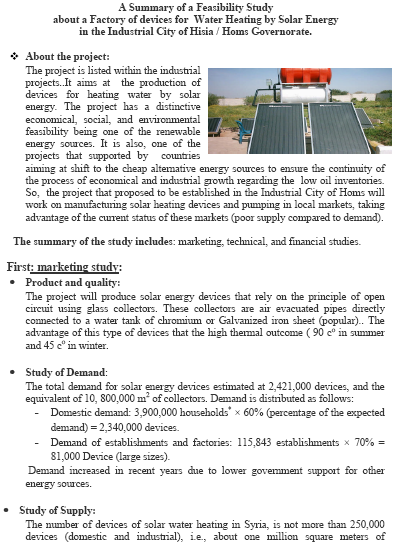Business in Syria

Foreign Trade and Business in Syria - Damascus
- Introduction to the Syrian Arab Republic (Middle East)
- Business in Damascus
- Syrian Economy
- Business Opportunities in Syria
- Syrian Foreign Trade
- Investment in Syria
- Access to the Syrian Market
- Business Plan for Syria
The objectives of the subject “International Trade and Business in the Syrian Arab Republic” are the following:
- To analyze the Syrian Economy and Global Trade
- To know the trade opportunities in the Syrian Arab Republic
- To explore the Syrian trade relations with the country of the student

The Subject “Foreign Trade and Business in Syria” belongs to the following Online Programs taught by EENI Global Business School:
Masters: International Business, Foreign Trade.
Doctorate: Islamic Business, World Trade.
Credits of the subject “Doing Business in Syria”: 1 
International Trade and Business in Syria.
Civil war in Syria.

- North-South Corridor (India-Russia)
- Access to the:
- Transport Corridor Europe-Caucasus-Asia
- Islamabad-Istanbul Corridor
- Trans-Caspian Trade and Transit Corridor (Central Corridor)

Syrian Preferential Access and Trade Agreements:
- Syria and the Arab Economic Area
- Trade Agreement with Saudi Arabia, Kuwait, Emirates, Jordan, Iran..
- Turkey-Syria Agreement
- Greater Arab Free-Trade Area (GAFTA)
- Islamic Trade Preferential System
- Arab Bank for Africa (BADEA)
- Syria-EU:

- WTO (in process of accession)
- WCO
- Rail Transport Committee
- Hamburg Rules (Sea)
- IRU
- TIR Convention
- Guidelines on Safe Load Securing for Road Transport
- COTIF Convention (Rail)
- CIM, CIT Rail Rules
- BIC (Containers)
- Chicago Convention (ICAO)
- IMO - not a member

- Arab League
- Summit of South American-Arab Countries
- Asia-Middle East Dialogue (AMED)
- Islamic Development Bank
- Economic Commission for Western Asia (ESCWA)
- OIC
- Arab Development Funds
- Afro-Arab Cooperation
- BADEA
- Arab Trade Financing Programme

- UN
- WB
- WTO
- IMF
The Syrian Arab Republic.
- Syrian Population: 17 million people
- Capital of Syria: Damascus
- Syrian largest city: Aleppo
- Arabic is the language of 90% of the population and the official language of Syria
- The Syrian Arab Republic shares borders with Turkey, Iraq, Jordan, Israel, and Lebanon
- Area of Syria: 185,180 km²
Religion in Syria.
- 70% of the Syrian are Muslims Sunni, 15% Shiites and 10% are Christians
- The main school of Islamic Jurisprudence is the Hanafi
Syria belongs to the Arab Economic Area.

Syrian Economy
Important Note: The Arab region is undergoing deep changes, many countries are changing rapidly, some to more open economies, and others not. In the case of Syria, the civil war situation makes it extremely complex to do business in Syria. Furthermore, it is hard to reflect these socio-political changes on the course content.
- Syrian Petroleum industry accounted for 23% of the Syrian GDP
- Syrian manufacturing sector accounts for only 6% of the GDP, employing 11% of the population
- In a medium and long-term (beyond petroleum and gas sector) could open up opportunities for the foreign direct investment in the food sector
- In the Syrian Arab Republic products must be labeled indicating the country of origin
- Labeling: bilingual (Arabic and English), especially for consumer goods is advised
- Currency of Syria: Syrian Pound (SYP)


Syrian Foreign Trade
- Top suppliers of Syria: Italy, Germany, France, Turkey, Ukraine, Saudi Arabia, and the U.S.
- Top export markets of Syria: Germany, Italy, France, Saudi Arabia, Iraq, and Turkey
- The Syrian Arab Republic is not a member of the WTO
- The import duties are very high
Syrian Regional Institutions and Trade Agreements.
Syria has Trade Agreements with Saudi Arabia (1972), Egypt (1990), Kuwait (1991), Lebanon (1998), the UAE (2000), Qatar (2000), Iraq (2001), and Jordan (2002). The trade agreement with Turkey will lead to a Free-Trade Area.
(c) EENI Global Business School (1995-2024)
We do not use cookies
Top of this page




 or
or 

